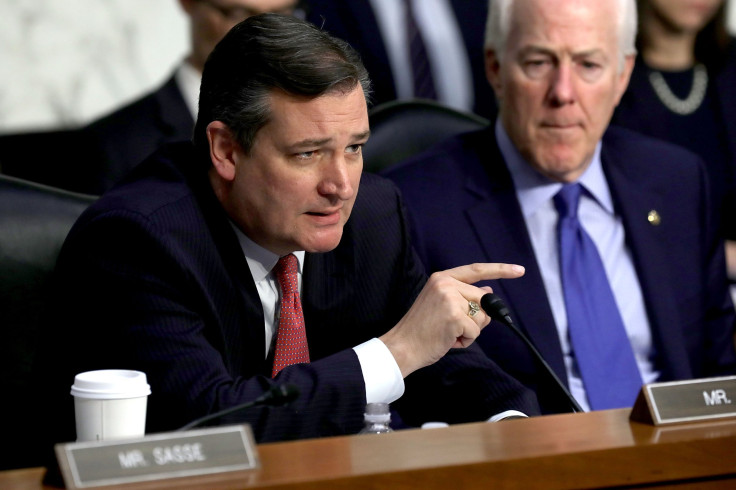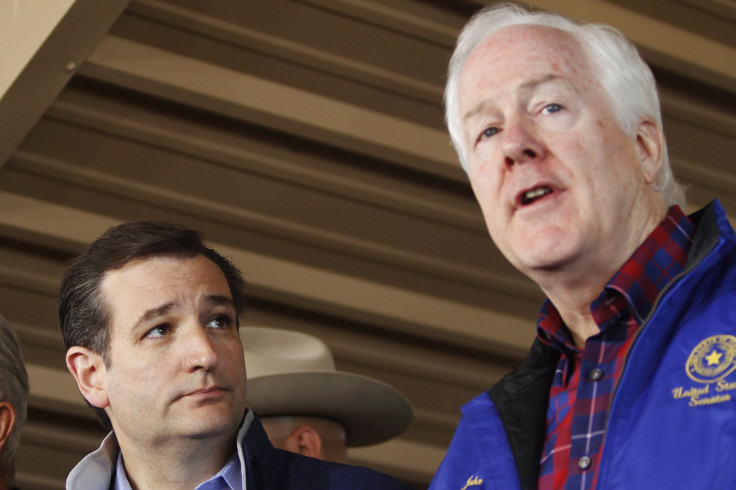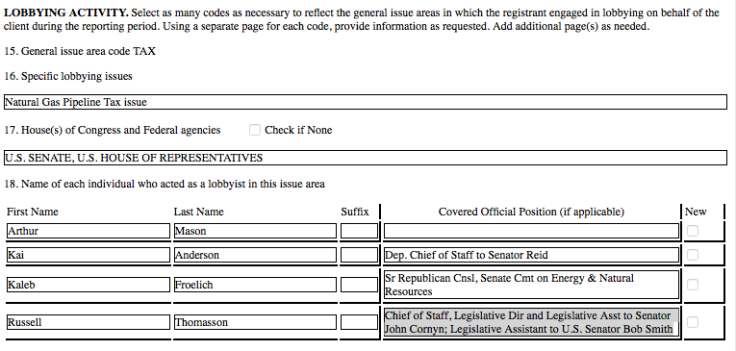Cornyn Pipeline Amendment Enriches GOP Lawmakers; Language Inserted As Cornyn’s Former Aide Lobbied On The Issue

Sen. John Cornyn, R-Texas, inserted language into the final tax bill that would enrich three different constituencies: fossil fuel firms, Republicans’ major campaign donors and a handful of Cornyn’s GOP congressional colleagues including Texas Sen. Ted Cruz and two other Texas lawmakers in the House. Cornyn originally added the language in an amendment to the Senate bill at the same time his former chief of staff was lobbying both the House and Senate on the tax treatment for those same oil and gas partnerships.
Cornyn’s amendment ensures Master Limited Partnerships (MLPs), which are publicly traded partnerships that aren’t required to pay corporate income taxes, get the “pass-through” tax break in the final tax bill. Congressional Republicans have settled on a 20 percent deduction for some types of pass-through entities in their final tax bill as a way to give those businesses, which don't pay corporate taxes, some of the tax relief the bill gives to corporations, which do pay the corporate levy.
MLPs were first created in the 1980s, but by the end of the decade lawmakers, worried about revenue loss, restricted their use to certain industries — primarily natural resource extraction. Today they are mostly used by investors in oil and gas pipelines, who use the vehicles to raise capital and avoid corporate taxes.
An International Business Times investigation last week revealed that 16 members of Congress — 13 Republicans and three Democrats — are invested in between $4.6 million and $10.6 million worth of MLPs. Those lawmakers stand to benefit from Cornyn’s amendment, which reduces levies on income from MLPs, leaving more money for distributions to investors. Reps. David Trott of Michigan and Thomas MacArthur of New Jersey and Sen. David Perdue of Georgia, all Republicans, are among those who may see the biggest tax reductions. (See list below.)
Cornyn’s office did not respond to an IBT request for comment. In a previous statement sent to the Huffington Post, Cornyn’s spokesperson portrayed the amendment as a technical change: “Under current law, publicly traded master limited partnerships (MLPS) are taxed as pass-through entities, and this amendment simply preserves that status in the new bill.”

Cornyn is a member of the Senate Finance Committee that crafted the Senate version of the bill. He was also part of the conference that reconciled the House and Senate bills to produce the final tax legislation, which Congress is scheduled to vote on in the coming days.
His amendment is separate from an Orrin Hatch-sponsored real-estate LLC tax break that prompted criticism of Republican Sen. Bob Corker — who reversed himself and backed the bill after the LLC provision was added. Corker earned up to $7 million from real estate LLCs last year and could be enriched by the provision.
The MLP amendment, which delivers a flat 20 percent deduction to the partnerships, was introduced on November 30. In the months leading up to the amendment, Russell Thomasson, a former Cornyn staffer-turned-lobbyist, has been lobbying on tax issues related to natural gas pipelines, records reviewed by IBT show.

Thomasson’s lobbying work on MLP tax issues is on behalf of an energy conglomerate, Loews Corporation, which owns a MLP, Boardwalk Pipeline Partners. Loews spent $20,000 per quarter throughout 2017 to hire Thomasson’s firm, Cassidy & Associates, to lobby on the “natural gas pipeline tax issue.” Loews’ in-house lobbyists simultaneously lobbied on the tax issues related to pipelines, records show. Among other issues, Loews said they were lobbying to “educate lawmakers on the value of section 7704 of the Internal Revenue Code.” Section 7704 is the law that defines the tax treatment of MLPs.
A Loews spokesperson did not respond to questions about the company’s lobbying activity.
Thomasson was a long-time Cornyn staffer, starting out as a legislative assistant in 2003 and working his way up to become the senator’s legislative director in 2007. After six years in that position, he served as Cornyn’s chief of staff from 2013 to 2015. In 2015 he left to become a lobbyist at the powerful D.C. firm Cassidy & Associates, where he was immediately given the title of executive vice president.
In its most recent annual report filed with the Securities and Exchange Commission, Boardwalk Pipeline Partners, which is its own publicly traded company that is majority-owned by Loews, noted that maintaining or furthering its special tax status is integral to its business model, writing: “If the Internal Revenue Service (IRS) were to treat us as a corporation for federal income tax purposes, or if we were to become subject to material amounts of entity-level taxation for state tax purposes, then our cash available for distribution to our unitholders would be substantially reduced.”
Cornyn’s amendment also extends the 20 percent deduction to income from Real Estate Investment Trusts (REITs), another type of publicly traded partnership that, as the name suggests, invest in real estate.
© Copyright IBTimes 2024. All rights reserved.





















